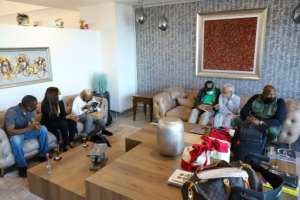Two African American survivors of a century-old massacre in the United States were in Ghana Sunday with their grandchildren at the start of a visit to connect with their “motherland.”
Viola Fletcher, 107, known as ‘Mother Fletcher’, and her brother Hughes Van Ellis, 100, known as ‘Uncle Red’, are from the district of Greenwood in the Oklahoma city of Tulsa that was devastated in 1921 by a mob of armed white people.
Up to 300 African Americans were killed in the attack on the area nicknamed “Black Wall Street” and some 10,000 left homeless when the district was set ablaze, leaving a vibrant economy in ruins.
Fletcher and Ellis were accompanied by their grandchildren on a week-long trip to the West African nation, as part of a government campaign to attract people of African heritage abroad ‘back home’.
The siblings landed in Ghana’s capital of Accra on Saturday with beaming smiles, waving from their wheelchairs to airport onlookers cheering ‘welcome home’.
“It’s my first time on the continent of Africa and I’m just thrilled to be here,” said Ellis’ daughter, Mama.
As they made their way out of the airport, the survivors were given flowers and sashes saying: ‘Beyond the Return’ – in reference to the government campaign launched in 2019, four centuries after the first slave ship landed in what is now the United States.
“My grandparents are extremely excited to be home for the first time on the motherland,” said Fletcher’s grandson, Ike Howard. “If you haven’t visited Africa, this is the time to come.”
“We’re in the middle of a pandemic but tomorrow is never promised to anyone.”
Viola Fletcher said she relives memories of the massacre every day.
“On that first night, in 1921, I went to bed in my family’s home in Greenwood,” she recalled, in a statement published by the Diaspora African Forum.
The non-profit organisation co-sponsored the trip with Our Black Truth, a social media platform where African descendants can learn about their history.
“I had everything a child could need… But within a few horrible hours, all of that was gone,” said Fletcher.
“Now after all these years, I’m so happy to be fulfilling a lifelong dream of going to Africa and I am so pleased that is to beautiful Ghana.”
Symbolic titles
Ghana has long played a role as a hub of thought and memory for the broader black community.
American writer and civil rights activist Maya Angelou lived in Accra in the early 1960s.
For Nadia Adongo Musah, from the government’s diaspora affairs, the survivors’ visit is just as historic.
“I think this is one of the biggest historic African diasporans that have come back to us,” said Musah.
The family is scheduled to visit historical sites from the colonial era and receive symbolic titles during traditional ceremonies.
They will also attend a church service on Sunday.
For Musah, the visit is an opportunity to show Ghana is “open” and “safe”.

Hughes Van Ellis (3rd L), his sister Viola Ford Fletcher (2nd L), and family members arrived in Ghana’s capital on Saturday. By Nipah Dennis (AFP)
“107 years old and have the passion and interest to visit Ghana, not only by herself but also bringing along her younger brother who is 100 years old… I think this will go far,” she said.
In April, some of the last survivors of the Tulsa massacre testified before the US Congress and asked that the country recognise their suffering.
No one was ever convicted over the destruction of Greenwood, and insurance companies, claiming that the unrest was the result of riots, refused to reimburse black victims.
Marking the centenary of the massacre, President Joe Biden said he recognised that “there was a clear effort to erase” the event from the nation’s memory.
Source: Modern Ghana

